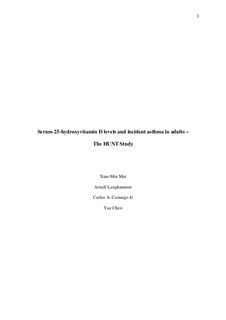Serum 25-Hydroxyvitamin D levels and incident asthma in adults; the HUNT study
Journal article, Peer reviewed
Accepted version
Permanent lenke
http://hdl.handle.net/11250/2445682Utgivelsesdato
2012Metadata
Vis full innførselSamlinger
Sammendrag
The impact of low vitamin D status on asthma development is unclear. The authors investigated the relation between the baseline serum 25-hydroxyvitamin D (25(OH)D) level and incident asthma in adults, including possible effect modification by allergy status, using allergic rhinitis as a proxy measure. A cohort of 25,616 Norwegian adults aged 19–55 years participated in 2 surveys of the Nord-Trøndelag Health Study known as HUNT 2 (1995–1997) and HUNT 3 (2006–2008). Of this cohort, a nested case-control study included 584 new-onset asthma cases and 1,958 nonasthma controls whose baseline serum 25(OH)D levels were measured. After adjustment for potential asthma risk factors, the baseline serum level of 25(OH)D (<50 nmol/L) was not significantly associated with asthma in either women (adjusted odds ratio = 0.94, 95% confidence interval (CI): 0.67, 1.32) or men (adjusted odds ratio = 1.47, 95% CI: 0.93, 2.32). In men, allergic rhinitis modified the association with the adjusted odds ratio being 0.87 (95% CI: 0.36, 2.06) among men with allergic rhinitis and 2.32 (95% CI: 1.06, 5.10) among men without allergic rhinitis. The serum 25(OH)D level was not associated with incident asthma in women, regardless of allergy status. Low vitamin D status was not significantly associated with incident asthma in most adults, but it may have increased risk among men without allergy.
